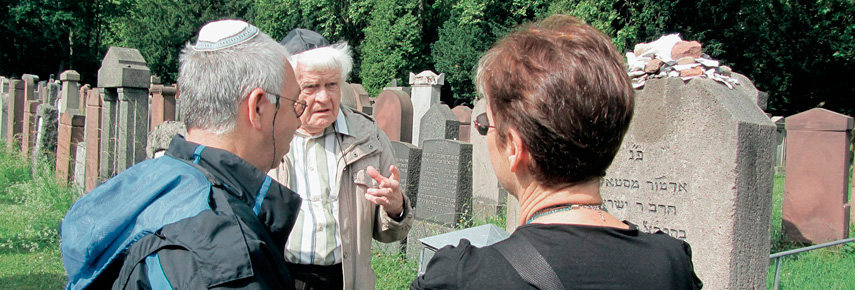Ernst Sommer was deported to Theresienstadt on 15th September 1942, and later on to Auschwitz. According to the Federal archives he died there on 23rd January 1943, although a witness claimed to have seen him later in Theresienstadt. Two commemorative stumbling stones were placed in front of Betty and Salomon Sommer’s former dwelling in the Schleidenstrasse 26 on the initiative of residents of the house in 2010.
In 2013 two further stumbling stones in memory of Margot and Ernst Sommer were laid in front of their house in the Taunusstrasse. Nancy Sommer, Ernst Sommer’s great niece and granddaughter of Julius Sommer, took part in the ceremony.
The locket
Before her deportation Margot Sommer had entrusted an acquaintance with a locket containing a photo of her brother. Margot had always worn this locket and had asked her friend to try and find the whereabouts of her brother and give it to him.
The two women knew each other through Margot’s uncle Salomon Sommer. Ida Leiser had been an employee in his butcher’s shop in the Alte Gasse. She lived in a so called “mixed marriage.” She and her three children had been baptized as protestants. As they came from a Jewish family however, they had not only to wear the “gelber Stern” (yellow star) but also to carry out forced labour in various companies in Frankfurt, amongst others Osterrieth in the Gallus district and later Bykopharm in the Friedberger Anlage.
Ida Leiser’s daughter Emmi remembered that her mother had supported Margot Sommer and had later received two letters from her. “Oh God, now the Sommers also have to leave”, this statement of her mother’s had a firm place in Emmi’s memory.
Towards the end of the war, on 18th February 1945, Ida Leiser was still sent “to forced labour in Theresienstadt” and was released there on 23rd June 1945 from whence she returned to Frankfurt. As two of her daughters had emigrated to the USA in 1947 and married there, she spent part of the time with them in America. For many years she tried to find the whereabouts of Helmut Sommer. In 1993 Ida’s daughter Emi visited her mother’s former hometown at the invitation of the city of Frankfurt. During her stay she was presented with the book ”…dass wir nicht erwünscht waren” (…that we were not welcome), which members of the Projekt Jüdisches Leben in Frankfurt (Project Jewish Life in Frankfurt) had published shortly beforehand. In this book she discovered the life story of Martha Hirsch, one of the daughters of Salomon and Betty Sommer, as well as a photo of her mother’s previous employer. With the help of other participants in the visitors programme Emmi Enxuto-Leiser managed to seek out Martha Hirsch in New York, who then put her in touch with Helmut Sommer’s widow.

